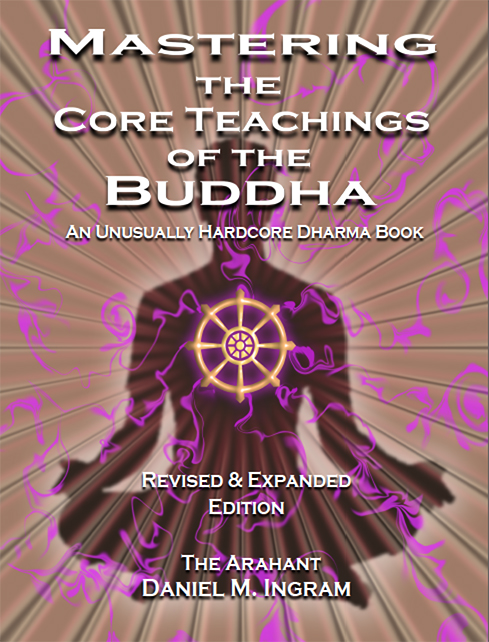Let Me Tell You About My Spiritual Journey...
I seem to remember that these two quotes are from Daniel Ingram:
-
If there's one thing guaranteed to make the heart sink it's someone saying to you, 'Let me tell you about my spiritual journey...'.
-
There are all sorts of good ways of learning the dharma: books, teachers etc. the only one I wouldn't recommend is the internet.
So, let me tell you about my spiritual journey, which takes the form of internet links.

In the final days of 2020 I experienced a Dark Night Of The Soul:
Spiritual seekers, beware! The path to enlightenment can be both rewarding and treacherous. Many great spiritual seekers throughout time have described how their spiritual practices underwent a period laden with darkness, despair, fear, anxiety, depression, and hopelessness. This concept was originally coined the “Dark Night of the Soul” by St John of the Cross, a Spanish poet and priest in the 1500’s. References to the Dark Night can also be found in Buddhist, Kundalini, Pagan/Occult, Christian, Jewish, and Islamic literature.
All I could do was stumble forward. I didn’t know what was going on. I didn’t know if I was going to survive. I didn’t know anything. I had no comfort. All I did, and all I could do, was put one foot in front of the other, and wander forward in the dark. Be kind to yourself during this time. Just do your best. That is enough.

Ingram says that the dharma can be presented in many different ways, each appealing to a different 'aesthetic' preference in the reader or listener. I found that Shinzen Young 'spoke my language'. Here's clip of Shinzen answering the question, 'After enlightenment, what's left, what's the point?'.

I've quoted him in anticipation of finally coming to Daniel Ingram's book Mastering The Core Teachings Of The Buddha, which was pivotal in my understanding of the dharma. There are many points where I now don't necessarily agree with Ingram, but the book does an excellent job of setting out a clear and coherent position.

I became very taken with the Satipatthana Vipassana by Mahasi Sayadaw. Written in the 1950s it describes something of an enlightenment bootcamp where people would come to practice the the technique of 'noticing'. He writes at the end:
Impermanence, suffering and non-self will be realized through direct personal experience, and with the full development of these knowledges, Nibbana will be realized. It will not take long to achieve the objective, possibly one month, or twenty days, or fifteen days, or, on rare occasions, even in seven days for those select few with extraordinary parami.
It's not for the faint hearted though:
"In the hard struggle, one may be reduced to a mere skeleton of skin, bones and sinews when one's flesh and blood wither and dry up, but one should not give up one's efforts so long as one has not attained whatever is attainable by manly perseverance, energy and endeavor." These instructions should be followed with a strong determination. It may be possible to keep awake if there is strong enough concentration to beat off sleep, but one will fall asleep if sleep gets the upper hand.
![]()
The person that I currently find myself most closely in agreement with is a mysterious person on the internet who goes by the name of Shargrol. Here Shargrol talks about the progress of meditation:
A confused, tangled mind is like a hand that is holding onto something. At first, the hand is kind of numb and we might not even realize how tightly we're holding onto it. But as we practice and grow older/wiser, we realize that indeed we're holding really tightly and it's a lot of work for the hand. We might imagine "oh, I'll just let go", but our hand has been holding on so long that it really can't just let go. But we can create a little bit of space, a little bit of movement through practice, which is encouraging.
Unfortunately, when we start waking up the hand and learning how to move it a little, we start recognizing how much discomfort is there. Whatever we're holding onto is causing pain. It's sharp sometimes like a knife. Other time it's blunt and hurts like a sledgehammer. We might stop there, because we don't want to let free whatever is inside of our hand.
But we might also notice that when we open our hand, the tissues of the hand are starting to get bloodflow and the muscles are starting to unfreeze and the nerves become alive. So whatever is in the hand, it's still scary but opening the hand feels kind of good. Well actually, first it hurts a little even though we know what we're doing is right. Yeah, it still hurts and if anything, there is a temptation to stop, not go forward. But something in us knows that going through life with our hand permanently clenching around something limits our life -- and we're drawn to fixing the problem, even though we don't know how it's going to happen or how long it takes, or what the thing in our hand is.
Each time we move the hand a little, we realize things about ourself that drove the clenching. We think grabbing onto something will give us protection, make us safe, make us smart, make us loved, make us wise, make us respected --- we see how our mind thinks and how our body behaves due to our very subtle intentions.
So we keep trying to move the hand, wake it up a little, and more muscle and nerve pain occurs, but we start to see more and more progress. At a certain point, we're almost able to see what is in our hand and we want to rush to open it --- and we go too fast too soon and reinjure our hand and it locks up again. And then we realize, it isn't our decision, we have to work with the hand not against it. We have to practice but also allow ourselves to recover from practice. We can't bite off more than we can chew. We can't carry more than we can lift. Otherwise, we just keep injuring ourself. So we need to learn about pacing and sensitivity and self-care...
Eventually at some point, our hand softens enough that we can open and close it a little, we can actually feel a range of motion and be present with the hand. This is like going through the stages of insight -- awareness is maintained throughout many flavors of mind and there isn't a desire to escape, but rather to be with what is occuring as it occurs. The things that made us grab tighter don't have the same reaction anymore. We can be with body discomfort, bliss, fear, misery, disgust, a desire for deliverance, and nothing-much-going-on... and we don't quit sitting. We sit right through it all. The hand begins to feel safe and cared for and opens even more... And maybe we get a glimpse of what's inside ---- and we develop an insight that the big thing that we were holding on so tightly to... maybe isn't there. Maybe we've been holding on so tightly to our own hand, crippling our own hand, out of fantasy and fear. Wow!
So this would be like 1st Path. But here's the thing: even though that glimpse gives you new confidence, guess what's involved in the later paths? More relaxing, healing, and opening the hand. And awakening is actually having the hand completely open and seeing that there is nothing at all in the hand. So it is all about learning to relax, heal, and open the hand. That's it. That's everything in this practice.
In this example, it might be tempting to say that getting that first peak into the hand is what makes a big difference ---- but hopefully I've poetically shown that the real benefit happens every time you sit. Your mind gets better and better the more you can "loosen the hand" and this is where the real work and the real benefit occurs. And we would never get a glimpse of the nothing in the hand if we didn't do the easy and consistent work of trying to loosen it a tiny bit every day.
So nothing heroic is needed and there isn't a special method beyond daily practice and daily recovery. Quality practice and then living your life with the new awareness, eating well and sleeping well, and then doing it all again. It's the only way. It's not really hard practice, but it's long practice. Long and easy is the way to go. Be kind with yourself, don't rush, don't slack off. Trust that your own mind is smarter than you and you'll learn over time. It's really amazing, even though we don't know right now, the mind figures all this stuff out, step by step. That's why there are meditation maps -- there is something innate and predictable about how we slowly discover this stuff over time.
Shargrol's thoughts come to us as posts to various websites scattered throughout the web. Thankfully his writings have been collected in A Compilation Of Shargrol's Posts.
Finally, I'm currently reading A Dark Night Of The Soul by John Of The Cross.